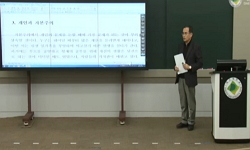한국에서 신자유주의에 대한 논의가 많이 있었음에도 불구하고, 신자유주의가 무엇인지, 한국에서의 신자유주의의 특수성이 무엇인지, 한국 정부들의 경제이념이 신자유주의로 설명할 수 ...
http://chineseinput.net/에서 pinyin(병음)방식으로 중국어를 변환할 수 있습니다.
변환된 중국어를 복사하여 사용하시면 됩니다.
- 中文 을 입력하시려면 zhongwen을 입력하시고 space를누르시면됩니다.
- 北京 을 입력하시려면 beijing을 입력하시고 space를 누르시면 됩니다.
https://www.riss.kr/link?id=T11014027
- 저자
-
발행사항
서울 : 연세대학교 대학원, 2007
- 학위논문사항
-
발행연도
2007
-
작성언어
한국어
-
주제어
신자유주의 ; 경제정책 ; 규제정책 ; 재정정책 ; 민영화 ; 시장개방 ; 노동정책 ; neoliberalism ; economy policy ; regulatory policy ; financial policy ; privatization policy ; open-market policy ; labor policy
-
발행국(도시)
서울
-
기타서명
Analyzing the neoliberal character of the economy policies of the Korea governments
-
형태사항
iv, 112 p. : 도표 ; 26 cm
-
일반주기명
지도교수: 신명순
- 소장기관
-
0
상세조회 -
0
다운로드
부가정보
국문 초록 (Abstract)
한국에서 신자유주의에 대한 논의가 많이 있었음에도 불구하고, 신자유주의가 무엇인지, 한국에서의 신자유주의의 특수성이 무엇인지, 한국 정부들의 경제이념이 신자유주의로 설명할 수 있는지에 대한 합의가 이루어지지 않았다. 이렇게 합의가 이루어지지 않은 이유는 신자유주의 개념 자체의 모호성에도 있지만, 기존 연구들이 한국의 특수한 조건들을 고려하지 않았거나, 고려했더라도 지나치게 제한된 사례만 보았기 때문이다. 이러한 한계를 극복하기 위해서는 신자유주의가 무엇이고, 그것이 현실에 적용될 때 어떤 경제정책으로 나타나며, 각 나라의 특수한 상황 속에서 어떻게 변용되는지를 종합적으로 검토해야 한다. 이 연구는 신자유주의가 근본적으로 경제이념이라는 점을 감안하여 김영삼 정부 이후 각 정부가 실행했던 경제정책의 신자유주의 성격을 살펴보고자 했다.이 연구 규제정책, 재정정책, 민영화 정책, 시장개방 정책, 노동정책 등 다섯 가지 경제정책을 살펴보았다. 김영삼 정부 이후 각 정부가 실행했던 경제정책의 신자유주의 성격을 살펴보면 규제정책, 민영화 정책, 시장개방 정책, 노동정책에 대해서는 그 실행의 속도와 수준의 차이가 있지만 대체로 각 정부가 신자유주의를 추구했음을 보여준다. 그러나 재정정책, 특히 정부조직 규모와 복지정책, 세금정책의 경우, 각 정부가 그것을 신자유주의에 따랐다고 단정하기 힘들다. 한국 역대 정부들의 재정정책이 신자유주의로 설명하는데 한계가 있는 이유는 한국이 발전국가를 경험했기 때문에 서구 복지국가와 같은 재정상황에 아니라는 점, 그리고 각 정부의 이념적 성격에 따라서 변동의 여지가 컸다는 점 때문이다. 김영삼 정부 이후의 세 정권의 경제 이념은 신자유주의로 설명할 수 있지만 재정정책에 있어서 주어진 경제적 조건과 정권의 이념적인 위치를 고려하지 않고 신자유주의를 언급하는 것은 바람직하지 않다.
다국어 초록 (Multilingual Abstract)
Despite the affluent discuss about neoliberalism in Korea, there is no consensus on 'what is neoliberalism', 'what is special with the neoliberalism in Korea', and 'what makes the Korean Governments neoliberal'. The reason why there is no consensus is...
Despite the affluent discuss about neoliberalism in Korea, there is no consensus on 'what is neoliberalism', 'what is special with the neoliberalism in Korea', and 'what makes the Korean Governments neoliberal'. The reason why there is no consensus is due to the vague and too broad concept of neoliberalism and many focus on only limited examples. In order to overcome this situation, it is necessary to show what is neoliberalism, how neoliberalism actualize in forms of economy policy, and how the policies adapted in the specific environment like Korea in a comprehensive view.Considering that neoliberalism is an economical ideology, this thesis focused on five economy policies ― regulatory policy, financial policy, privatization policy, open-market policy, labor policy ―and examine whether they have neoliberal characteristics. In terms of regulatory, privatization, open-market, and labor policy, all three government since Kim Young-Sam government show evident neoliberalism, although there are some differences in the pace and degree of its execution. But financial policy, especially reducing government body, welfare policy and tax policy are hard to describe only in terms of neoliberalism. There are two reasons for this. First, because of the experience of the developmental state, Korea has a different financial condition compare with welfare states. Second, the relative ideological stance of the government can alter the execution of the policies. After Kim Young-Sam government, the economical ideology of Korea can be describe as neoliberalism, but it is necessary to consider the economical conditions of Korea and the ideological stance of the government when financial policy is discussed.












